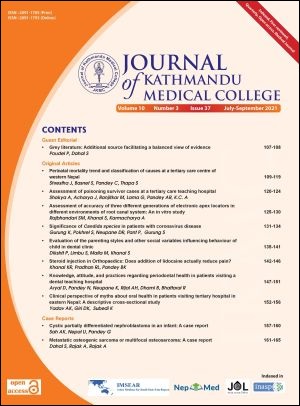Knowledge, attitude, and practices regarding periodontal health in patients visiting a dental teaching hospital
DOI:
https://doi.org/10.3126/jkmc.v10i3.41239Keywords:
Dental floss, Dental plaque, Oral health, Periodontal disease, ProbioticsAbstract
Background: Periodontal diseases, despite being preventable have an increasing prevalence worldwide. Mechanical plaque control methods are most effective to prevent and control these diseases.
Objectives: To assess the knowledge, attitude, and practices regarding periodontal health among patients visiting department of Periodontics, Kantipur Dental College and Hospital.
Methods: An analytical cross-sectional study was conducted by administrating pretested questionnaire to 384 patients in Kantipur Dental College and Hospital from Sep 2020 to Aug 2021. The study was conducted for one year after taking ethical clearance. All the patients who first visited the department of Periodontics were requested to participate by convenience sampling method. Statistical analysis was done to correlate among knowledge, attitude, and practices.
Results: Positive attitude and practices towards dental floss 165 (43%), tongue cleaning 273 (71.1%), replacing tooth brush 268 (69.8%), and regular dental visits 202 (52.6%) was demonstrated. There was lack of knowledge on interdental brushes 79 (20.52%), probiotics 52 (13.5%), gingival massage, and their use to improve periodontal health 17 (4.4%).
Conclusion: The majority of the respondents had good oral hygiene practices with favourable knowledge and attitude with respect to periodontal health and its measure to control the disease. Various preventive programs must be conducted regularly to brush up their knowledge. Further improvements should be focused on knowledge and attitude which can increase and improve the practice of oral health.
Downloads
Downloads
Published
How to Cite
Issue
Section
License
Copyright © Journal of Kathmandu Medical College
The ideas and opinions expressed by authors or articles summarized, quoted, or published in full text in this journal represent only the opinions of the authors and do not necessarily reflect the official policy of Journal of Kathmandu Medical College or the institute with which the author(s) is/are affiliated, unless so specified.
Authors convey all copyright ownership, including any and all rights incidental thereto, exclusively to JKMC, in the event that such work is published by JKMC. JKMC shall own the work, including 1) copyright; 2) the right to grant permission to republish the article in whole or in part, with or without fee; 3) the right to produce preprints or reprints and translate into languages other than English for sale or free distribution; and 4) the right to republish the work in a collection of articles in any other mechanical or electronic format.




